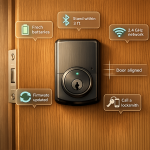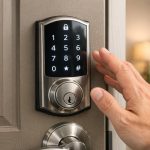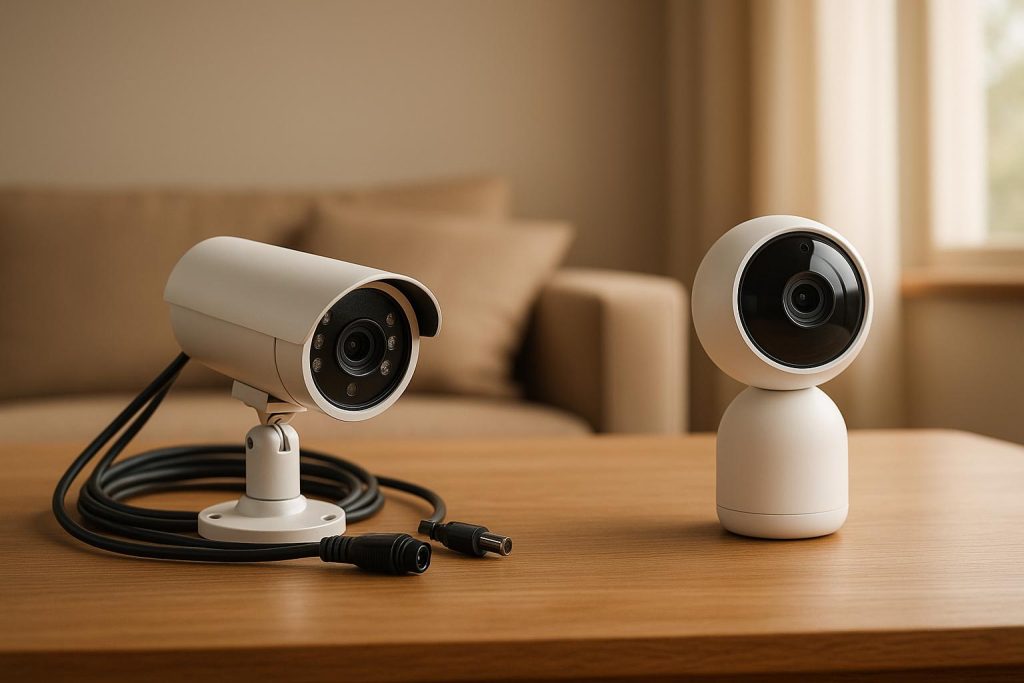When deciding between wired and wireless security systems, the choice hinges on installation needs, cost, flexibility, and performance. Wired systems use physical cables for power and communication, offering stable performance but require professional installation. Wireless systems rely on Wi-Fi or radio signals, making them easier to install and relocate, but they may face occasional signal issues. Here’s a quick breakdown:
- Wired Systems: Reliable, low-maintenance, and ideal for permanent setups. Higher upfront costs due to professional installation.
- Wireless Systems: Easy to install, portable, and great for renters or frequent movers. Lower initial costs but require battery replacements.
Quick Comparison
| Factor | Wired Systems | Wireless Systems |
|---|---|---|
| Installation | Professional; time-intensive | DIY-friendly; fast setup |
| Cost | Higher upfront; lower maintenance | Lower upfront; battery costs |
| Flexibility | Fixed setup; harder to modify | Easy to expand or relocate |
| Reliability | Stable, no signal interference | May face Wi-Fi or signal issues |
| Power Source | Hardwired electricity | Battery-operated |
| Portability | Difficult to relocate | Easily portable |
Key Takeaway: Choose wired systems for long-term reliability and wireless systems for convenience and portability.
Wired Security Systems: How They Work and Their Benefits
How Wired Systems Work
Wired security systems rely on physical cables to connect sensors, cameras, and detectors directly to a central control panel. These cables handle both power and communication signals, ensuring a steady connection and making the system less prone to interference.
The control panel acts as the system’s command center, processing signals from all connected devices and coordinating with monitoring services. This connection can be established through your home’s internet or a dedicated phone line. The direct wiring and centralized control contribute to the system’s reliability and performance.
Installation and Maintenance
Installing a wired security system requires professional expertise due to the need for routing cables through walls, ceilings, or floors. This process often involves drilling and structural modifications, making it less practical for rental properties. However, if you’re building a new home or undergoing significant renovations, it’s the perfect time to install a wired system, as open walls make the process much simpler and cost-effective.
Once installed, wired systems require little upkeep. Since they draw power directly from your home’s electrical system, there’s no need to worry about frequent battery replacements. The primary maintenance task is checking the battery backup periodically to ensure it’s ready for power outages.
Main Benefits of Wired Systems
Wired security systems stand out for their reliability. They are less susceptible to interference and eliminate issues like dead zones that can affect wireless systems. While the initial installation cost is higher, the components themselves are more affordable, and ongoing maintenance is minimal.
For new constructions, these systems are particularly cost-efficient, as installing them during the building phase avoids the added expense and complexity of retrofitting. Once in place, wired systems offer a dependable, low-maintenance solution, providing consistent protection with little need for ongoing attention.
Wireless Security Systems: How They Work and Their Benefits
How Wireless Systems Work
Wireless security systems rely on radio frequency signals and Wi-Fi to link various components to a central control panel. Using protocols like Z-Wave, Zigbee, or Wi-Fi, they eliminate the need for physical cables, making them highly flexible.
The control panel connects to your home’s Wi-Fi network and communicates with monitoring services through cloud-based platforms. This setup means you can access and control your system remotely via a smartphone app. Whether you’re at work or on vacation, you can receive real-time alerts and adjust settings as needed, as long as you have an internet connection.
Each component, such as motion sensors or door alarms, operates on battery power and has built-in transmitters. When a sensor detects activity – like a door opening or movement – it sends an encrypted signal to the control panel. These encrypted frequencies help protect against interference or unauthorized access. The simplicity of this wireless communication also makes installation a breeze.
Easy Installation and Expansion Options
One of the standout features of wireless security systems is how easy they are to set up. Most homeowners can install a basic system in just a few hours without needing professional help. The process usually involves mounting sensors and connecting everything through a smartphone app.
Because there’s no drilling or wiring involved, wireless systems are perfect for renters who can’t make permanent changes to their property. Components can be repositioned as needed, and the entire system can be packed up and reinstalled if you move to a new home.
Expanding the system is just as simple. Want to add a new camera or motion detector? Just purchase the device, pair it through the app, and mount it where you need it. Many systems support a wide range of devices, allowing you to start small – like with basic door and window sensors – and gradually add features like cameras, motion detectors, or even smart locks as your needs grow. This flexibility makes it easy to build a system that suits your home and lifestyle.
Main Benefits of Wireless Systems
The ease of installation comes with several practical benefits. For starters, wireless systems often have lower upfront costs. While individual components may cost slightly more than their wired counterparts, skipping professional installation can save you a significant amount of money.
These systems are also quick to deploy. You can have your home protected within hours, giving you peace of mind almost immediately. Their portability is another major advantage – perfect for renters or people who move often, as the entire system can be relocated and reinstalled in no time.
Wireless systems also integrate seamlessly with smart home devices. They can work with voice assistants, smart thermostats, and lighting systems, creating a more connected and convenient home environment. Cloud connectivity adds extra perks like remote monitoring, automatic updates, and access to detailed activity logs – all from your smartphone. Plus, their scalability means you can start with the basics and expand over time, spreading out costs while building a system that fits your needs.
Wired or Wireless: Which Type of Home Security System is Better?
sbb-itb-643e28e
Main Differences Between Wired and Wireless Systems
Choosing between wired and wireless security systems often comes down to differences in installation, cost, flexibility, and performance. Here’s a closer look at what sets these two options apart.
Installation Requirements
The installation process is where these systems differ the most. Wired security systems almost always demand professional installation. Why? Because running cables through walls, ceilings, and floors is no small task. It often involves drilling or cutting into drywall to create pathways for the wires. Professionals not only handle the physical setup but also ensure the system integrates smoothly with your home’s electrical layout. This complexity naturally impacts the overall cost and limits how easily the system can be customized later.
On the other hand, wireless systems are much simpler to install. They’re often considered DIY-friendly, as there’s no need for physical cables. Most homeowners can set up a basic wireless system in a few hours using straightforward mounting hardware. Sensors and cameras connect via your existing Wi-Fi network, making the process quick and hassle-free.
Cost Considerations
The differences in installation also affect the costs. Wired systems come with higher upfront expenses, primarily due to labor-intensive installation. While the components themselves are usually less expensive than wireless ones, the added cost of professional setup can make these systems a bigger financial commitment.
Wireless systems, however, are generally more budget-friendly. Self-installation eliminates labor costs, and while you might spend slightly more on individual components, the overall investment tends to be lower. Keep in mind, though, that wireless systems may require occasional battery replacements, which add minor ongoing costs. Wired systems, by contrast, avoid this type of maintenance expense.
Flexibility and Modification Options
Flexibility is another area where wireless systems shine. Because they don’t rely on fixed wiring, they’re much easier to upgrade or modify. For example, adding a new sensor or camera is as simple as pairing it with your app and mounting it where needed. Moving components to different locations is equally straightforward.
"Wireless systems provide more flexibility and are easier to manage." – RACAM Security & Communications
Wired systems, however, are less adaptable. Adding new features often means running additional cables, which can involve cutting into walls and hiring professionals. Since they’re fixed installations, making significant changes – like relocating the system – requires substantial effort.
Reliability and Performance
When it comes to reliability, wired systems have the edge. They deliver stable, interference-free performance because they don’t rely on wireless signals. This ensures consistent communication between components and the central control panel.
Wireless systems, while convenient, can face occasional challenges. Signal interference from other devices, thick walls, or large metal objects can disrupt performance. Internet outages might also affect features like remote monitoring, which depend on cloud connectivity. That said, modern wireless systems are equipped with backup options and strong encryption to address these issues. Wireless sensors also send low-battery alerts, but ignoring these can impact system performance.
Comparison Table
| Factor | Wired Systems | Wireless Systems |
|---|---|---|
| Installation | Professional installation; time-intensive | DIY-friendly; quick setup |
| Upfront Cost | Higher due to labor costs | Lower when self-installed |
| Component Cost | Generally lower per item | Higher per item |
| Ongoing Costs | Minimal maintenance | Occasional battery replacements |
| Flexibility | Limited; requires professional modifications | Highly flexible; easy to expand or relocate |
| Reliability | Stable, no interference | Reliable but can face signal challenges |
| Power Source | Hardwired electricity | Battery-operated with backups |
| Portability | Fixed installation; difficult to relocate | Easily portable and reconfigurable |
| Internet Dependency | Functions independently of internet | Remote features require internet connectivity |
How to Choose the Right Security System for Your Needs
Factors to Consider
Your choice of a security system largely depends on your living situation. If you own your home, you have the freedom to make permanent changes, which makes wired systems a viable option. Renters, on the other hand, often lean toward wireless systems. These systems are easier to install without requiring landlord approval and can be packed up and relocated when it’s time to move.
Cost is another critical factor. Wired systems usually come with higher upfront expenses, including professional installation and possible structural modifications. However, they tend to deliver reliable, long-term performance with minimal recurring costs. Wireless systems, while generally more budget-friendly at the outset – especially with self-installation options – may involve ongoing costs for maintenance or upgrades.
The layout of your home also plays a role. Older homes with thick walls or multiple floors can interfere with wireless signals, making wired systems a better choice. On the flip side, homes with accessible areas like attics or basements make wired installations easier. Modern homes with open floor plans and standard construction materials are typically compatible with either type of system.
Your comfort with technology is another important consideration. Wireless systems often require regular interaction with smartphone apps, troubleshooting Wi-Fi issues, and managing battery replacements. Wired systems, once installed, usually require less ongoing attention.
Lastly, think about your future plans. If you’re anticipating renovations, additions, or even a move, wireless systems offer the flexibility to adapt to these changes. Expandable wireless solutions make it easier to adjust your security setup as your needs evolve.
Professional Help and Local Options
Once you’ve weighed these factors, consulting a professional can make your decision clearer. While online research provides plenty of information, security experts bring personalized advice tailored to your specific home and needs. They can pinpoint vulnerable areas, recommend coverage strategies, and highlight potential installation challenges you might not have considered.
For example, Sherlock’s Locksmith in Pittsburgh, PA, specializes in residential security system installations and upgrades. Their certified technicians evaluate your home’s layout and security priorities to recommend the best wired or wireless options. Whether you need a simple setup or a system integrated with home automation, they’ve got you covered.
Professional advice becomes especially useful if you’re considering a hybrid system – a mix of wired and wireless components. These setups combine the reliability of wired systems for core security features with the flexibility of wireless sensors in hard-to-reach areas. Skilled technicians can ensure all components work together seamlessly.
Local professionals also bring insights that broader online guides might miss. They understand regional factors like Pittsburgh’s weather, common home designs, and neighborhood-specific security concerns. Plus, they can provide ongoing maintenance, support, and updates as your security needs change.
To find the best fit, schedule consultations with multiple professionals. Many reputable companies offer free assessments, giving you a chance to compare recommendations and pricing without any upfront commitment. Combining expert input with your personal preferences will help you choose a security system that suits your home and lifestyle perfectly.
Conclusion: Making the Right Decision
Choosing the right security system becomes easier when you understand the key differences. Wired systems are known for their reliability and long-term performance, making them a great fit for homeowners seeking a permanent solution and who are comfortable with the upfront installation costs. On the other hand, wireless systems offer flexibility and simple installation, making them ideal for renters or those who want the option to adjust their setup over time.
Your decision will largely depend on factors like your living situation, budget, home layout, and how comfortable you are with technology. For instance, if you live in an older home with thick walls or multiple floors, a wired system might perform better due to its stability.
For those looking for a blend of both, a hybrid system can be a smart choice. These setups combine the dependability of wired components with the adaptability of wireless ones. For example, you could use wired equipment for essential security features while adding wireless sensors in areas where running cables would be difficult or costly. This approach balances security and flexibility.
Getting expert advice can make all the difference. Professional technicians can evaluate your home, identify potential challenges, and recommend the best setup for your needs. They’ll also ensure proper integration with your home’s infrastructure. For residents in Pittsburgh, PA, Sherlock’s Locksmith provides professional security system installation services. Their certified technicians can help you decide whether a wired, wireless, or hybrid system works best for your home.
Don’t wait to secure your home. The right security system offers more than just protection – it brings peace of mind, knowing your family and property are safe around the clock.
FAQs
What should I consider when deciding between a wired and wireless home security system?
When choosing between a wired and wireless home security system, you’ll want to weigh factors like reliability, installation, cost, and flexibility to find the best fit for your needs.
Wired systems are often praised for their reliability because they aren’t impacted by things like signal interference or battery life. That said, they usually require professional installation, which can be both invasive and expensive – especially if your home is already built. In contrast, wireless systems are easier to install and offer more flexibility, making them a popular choice for renters or anyone planning to relocate. However, they can be more susceptible to signal interference and may demand stronger cybersecurity precautions.
When it comes to cost, wired systems often have lower upfront equipment expenses but higher installation fees due to the complexity of setting them up. Wireless systems, on the other hand, typically come with higher initial equipment costs, but their DIY-friendly setup can help you save on installation. Think about your home’s layout, your budget, and your long-term security goals to make the right decision.
What are the key differences in reliability and maintenance between wired and wireless security systems?
Wired security systems stand out for their steady performance because they rely on physical connections. This means they’re far less prone to issues like signal interference or disruptions, making them a solid choice for those who value consistency. Another advantage? They demand minimal upkeep since there’s no need to worry about replacing batteries or dealing with wireless components.
On the other hand, wireless systems shine when it comes to ease of installation and versatility. They’re simple to set up and can be adjusted or moved around with little hassle. However, they may encounter reliability issues due to signal interference and often require regular battery replacements, which can add to their maintenance over time. Ultimately, your decision will hinge on what matters most to you – reliability or convenience.
Can I combine wired and wireless components in my home security system, and what are the advantages?
Yes, it’s absolutely possible to mix wired and wireless components in a home security system, creating what’s known as a hybrid setup. This type of system combines the strengths of both technologies: wired components ensure a dependable connection and consistent power, while wireless elements make installation simpler and allow for easy adjustments or expansions.
By blending these two approaches, a hybrid system minimizes the chances of disruptions while giving you the flexibility to tailor your security setup to your home’s specific needs. It’s a smart choice for anyone wanting the reliability of wired systems with the convenience and adaptability of wireless options.









